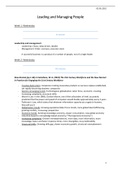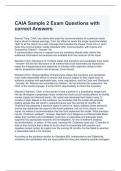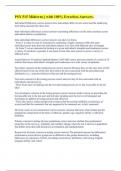05.05.2021
Leading and Managing People
Week 1: Wednesday
In-session
Leadership and management
- Leadership: Chaos, ideas driven, idealist
- Management: Order, oversees, executes vision
A successful business is a product of a number of people, not of a single leader
Week 2: Wednesday
Pre-session
New Normal (pp 1-36) in Castellano, W. G. (2014) The 21st Century Workforce and the New Normal
in Practices for Engaging the 21st Century Workforce
- Creative destruction: companies creating innovative products or services replace established,
yet rapidly becoming obsolete, companies
- Seismic converging trends: Technological, globalization, labor force, economic, creating:
Increasing complexity, structural shifts
- Moore's Law: In the 1960s, Gordon Moore, one of the cofounders of Intel, accurately
predicted that the power and speed of computers would double approximately every 2 years
- Parkinson’s Law, which states that whatever information capacity you supply to humans,
they will use it
- Globalization trends: Growing population/labor force trends, more global talent/offshoring,
growing markets, increasing competition
- Economic trends: Evolving knowledge economy, slower consumption, new global economy
- Industrial-based to a knowledge-based economy (“The Experience Economy”)
- Increasing complexity: Greater interdependencies, more data, more information, more
knowledge, faster and faster response times, more intangibles, less predictability
- Structural shifts: Growing skills gap, slower economic growth, structural unemployment
1
, 05.05.2021
Week 3: Wednesday
Pre-session
Frederic Laloux’s Reinventing Organization
- Employees show up with bodies, don’t show up with their hearts: This seems to be true for
all levels of employment levels (tired of rat-race, spending days in meetings, politics,
bureaucracy, high email volumes, budget cycles, etc.) → Question of meaning!
- Sign of birth pain, something old is dying and something new might be emerging → New
management paradigm and how we think about organization
- Different developmental steps of human history:
At each step we developed a new way to run organizations/
a new management paradigm
➔ Every new stage of organization is dramatically more
powerful than the previous one!
- First stage: Magic/ Tribal – “Just go out there and make slaves”
Today, some organizations are still working on the
same principles, e.g. street gangs, mafias, mercenary
armies. Fear-based. Key breakthroughs: Division of labor,
command authority
- Second stage: Traditional/ Agrarian
– Very hierarchical and stable
E.g. Catholic Church, Armies, Government agencies, Public school systems
Key breakthroughs: Formal hierarchy, replicable processes
- Third stage: Scientific/ Industrial
Scientific breakthrough and industrial revolution, world is not given by god but of
enlightenment – a complex machine based on scientific inquiry
Worldview of constant innovation and optimization, speeding up (e.g. MNCs, Wall Street)
Key breakthroughs: Innovation (e.g. R&D), accountability (the boss is giving goals to achieve
but employees can approach it themselves), meritocracy (social upward mobility)
Much of engineering language has made it into modern organizations
- Fourth stage: Post-modern/ Information (Post World War II)
Knowledge and ideas driven, E.g. Starbucks, Ben&Jerry’s; stage is focused on the soft sides
Key breakthroughs: Values-driven culture, empowerment, stakeholder model
- What’s next? e.g. Patagonia
Buurtzorg, a Dutch company, nursing at home – 10 to 12 people come to one nurse. Nurses
follow their own plan
Key breakthroughs: Self-management (no pyramid scheme), Wholeness (wearing a mask at
work is no longer required, people listen to desires), evolutionary purpose (purpose is more
important than market share)
2
, 05.05.2021
Self-management
Low complexity – Pyramid (all complexity is pushed to the top), High complexity – it exceeds
the ability of the hierarchy, it needs structure and coordination mechanisms
All complex systems today run without a hierarchy, e.g. global economy (lots of structure
but no boss), human cell, traffic, forests (no massive tree that dictates plants what to do
when winter is coming)
As the world is becoming more and more complex, we need to change the way our
organization operates – The pyramid structure cannot handle it
Adjustments include:
Job titles and
descriptions
Performance Conflict
management management
Compensation
Meetings
and incentives
Staff functions
Organizational Crisis
structure management
Decision
Dismissal
making
Information Project
flows managements
Investments
- Hierarchical decision making – Advice process – Consensus: Any person in the organization
can make any decision, including spending company funds. Two conditions: Seek expert
advice on the matter and the advice of those who are directly influenced by that decision
I do not need to seek any approval, its rather a process of collective intelligence
Fundamental innovation: A whole new decision-making mechanism
3
Leading and Managing People
Week 1: Wednesday
In-session
Leadership and management
- Leadership: Chaos, ideas driven, idealist
- Management: Order, oversees, executes vision
A successful business is a product of a number of people, not of a single leader
Week 2: Wednesday
Pre-session
New Normal (pp 1-36) in Castellano, W. G. (2014) The 21st Century Workforce and the New Normal
in Practices for Engaging the 21st Century Workforce
- Creative destruction: companies creating innovative products or services replace established,
yet rapidly becoming obsolete, companies
- Seismic converging trends: Technological, globalization, labor force, economic, creating:
Increasing complexity, structural shifts
- Moore's Law: In the 1960s, Gordon Moore, one of the cofounders of Intel, accurately
predicted that the power and speed of computers would double approximately every 2 years
- Parkinson’s Law, which states that whatever information capacity you supply to humans,
they will use it
- Globalization trends: Growing population/labor force trends, more global talent/offshoring,
growing markets, increasing competition
- Economic trends: Evolving knowledge economy, slower consumption, new global economy
- Industrial-based to a knowledge-based economy (“The Experience Economy”)
- Increasing complexity: Greater interdependencies, more data, more information, more
knowledge, faster and faster response times, more intangibles, less predictability
- Structural shifts: Growing skills gap, slower economic growth, structural unemployment
1
, 05.05.2021
Week 3: Wednesday
Pre-session
Frederic Laloux’s Reinventing Organization
- Employees show up with bodies, don’t show up with their hearts: This seems to be true for
all levels of employment levels (tired of rat-race, spending days in meetings, politics,
bureaucracy, high email volumes, budget cycles, etc.) → Question of meaning!
- Sign of birth pain, something old is dying and something new might be emerging → New
management paradigm and how we think about organization
- Different developmental steps of human history:
At each step we developed a new way to run organizations/
a new management paradigm
➔ Every new stage of organization is dramatically more
powerful than the previous one!
- First stage: Magic/ Tribal – “Just go out there and make slaves”
Today, some organizations are still working on the
same principles, e.g. street gangs, mafias, mercenary
armies. Fear-based. Key breakthroughs: Division of labor,
command authority
- Second stage: Traditional/ Agrarian
– Very hierarchical and stable
E.g. Catholic Church, Armies, Government agencies, Public school systems
Key breakthroughs: Formal hierarchy, replicable processes
- Third stage: Scientific/ Industrial
Scientific breakthrough and industrial revolution, world is not given by god but of
enlightenment – a complex machine based on scientific inquiry
Worldview of constant innovation and optimization, speeding up (e.g. MNCs, Wall Street)
Key breakthroughs: Innovation (e.g. R&D), accountability (the boss is giving goals to achieve
but employees can approach it themselves), meritocracy (social upward mobility)
Much of engineering language has made it into modern organizations
- Fourth stage: Post-modern/ Information (Post World War II)
Knowledge and ideas driven, E.g. Starbucks, Ben&Jerry’s; stage is focused on the soft sides
Key breakthroughs: Values-driven culture, empowerment, stakeholder model
- What’s next? e.g. Patagonia
Buurtzorg, a Dutch company, nursing at home – 10 to 12 people come to one nurse. Nurses
follow their own plan
Key breakthroughs: Self-management (no pyramid scheme), Wholeness (wearing a mask at
work is no longer required, people listen to desires), evolutionary purpose (purpose is more
important than market share)
2
, 05.05.2021
Self-management
Low complexity – Pyramid (all complexity is pushed to the top), High complexity – it exceeds
the ability of the hierarchy, it needs structure and coordination mechanisms
All complex systems today run without a hierarchy, e.g. global economy (lots of structure
but no boss), human cell, traffic, forests (no massive tree that dictates plants what to do
when winter is coming)
As the world is becoming more and more complex, we need to change the way our
organization operates – The pyramid structure cannot handle it
Adjustments include:
Job titles and
descriptions
Performance Conflict
management management
Compensation
Meetings
and incentives
Staff functions
Organizational Crisis
structure management
Decision
Dismissal
making
Information Project
flows managements
Investments
- Hierarchical decision making – Advice process – Consensus: Any person in the organization
can make any decision, including spending company funds. Two conditions: Seek expert
advice on the matter and the advice of those who are directly influenced by that decision
I do not need to seek any approval, its rather a process of collective intelligence
Fundamental innovation: A whole new decision-making mechanism
3





